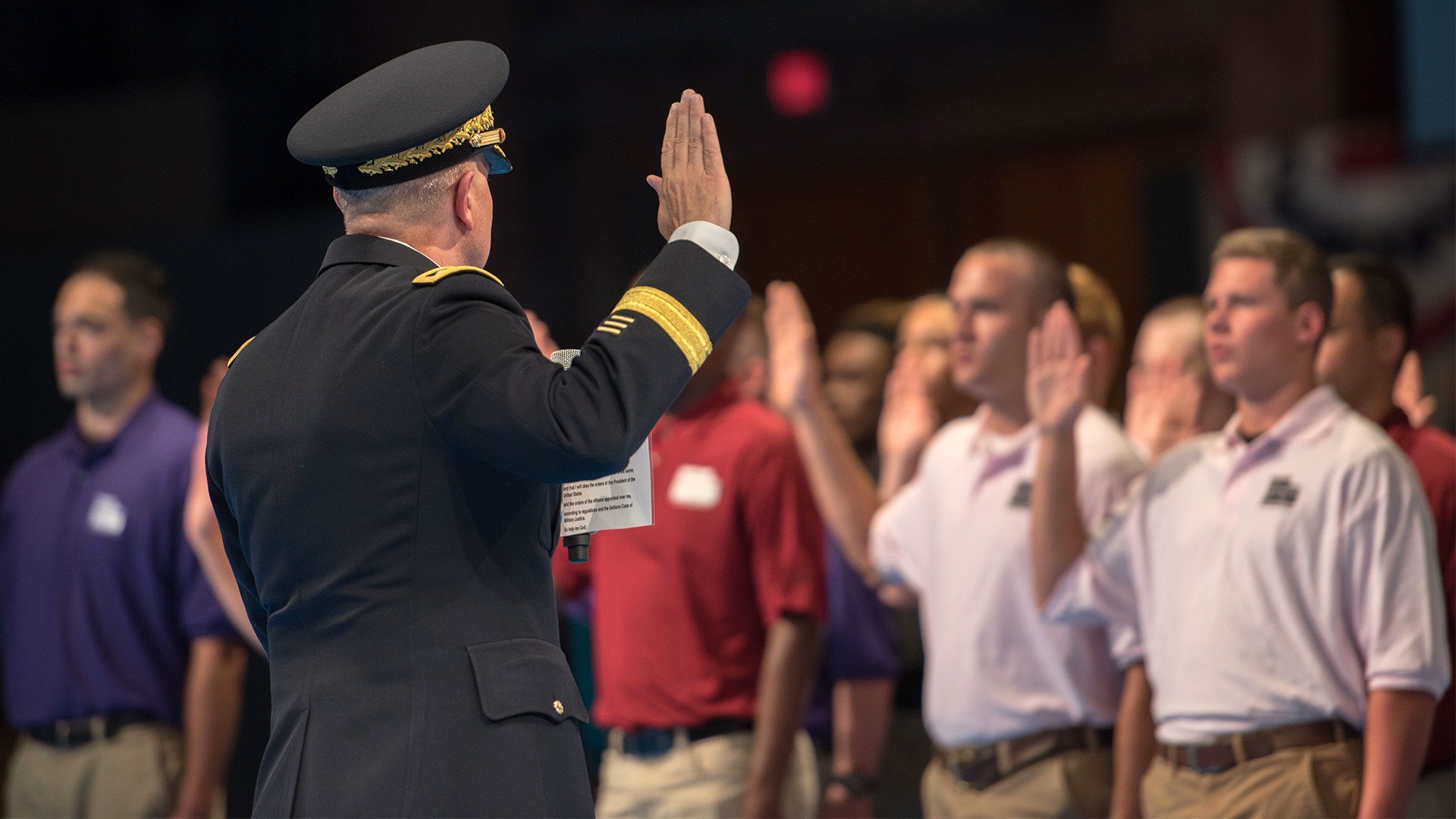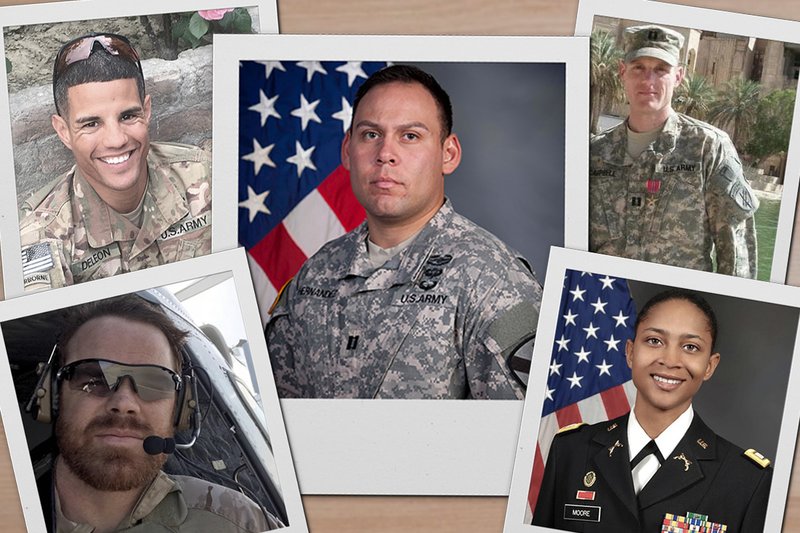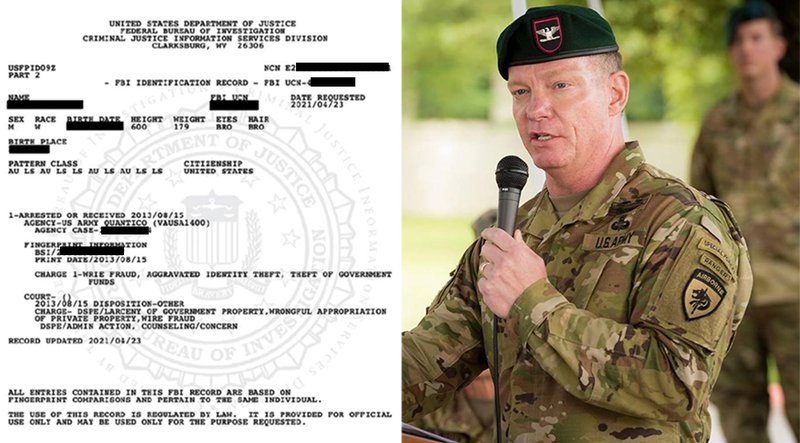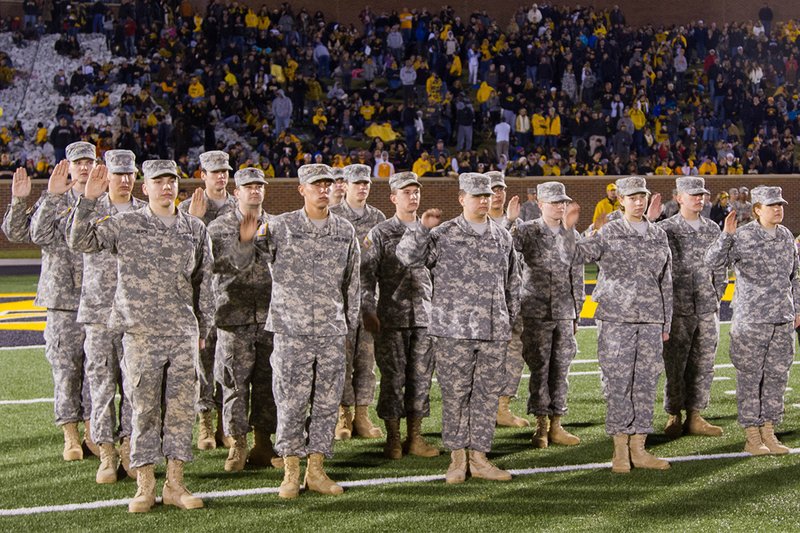‘About Darn Time’ — Army To Review Hundreds of G-RAP Recruiting Fraud Investigations

Lt. Gen. Timothy J. Kadavy, director of the Army National Guard, administers the oath of enlistment to 60 young men and women who joined the ranks of the Army National Guard, during a future soldier swearing-in ceremony July 18, 2018, at Joint Base Myer-Henderson Hall, Virginia. US Army photo by Sgt. Nicholas T. Holmes.
The Army’s Criminal Investigation Division will review more than 880 investigations of soldiers who were accused of fraud or other misconduct while participating in the now-defunct National Guard Recruiting Assistance Program, or G-RAP.
“It’s about darn time,” Jeffrey Addicott, a lawyer who has criticized the G-RAP investigation for years, told Coffee or Die Magazine Thursday, July 21. “I’ve been representing [...] scores of G-RAP cases where innocent soldiers have had their careers set back or destroyed over fallacious investigations.”
Lawyers and soldiers’ advocates believe hundreds — if not thousands — of current and former service members may have misleading marks on their criminal records due to participation in the program, which paid part-time soldiers $2,000 for each enlisted Guard member they referred to the service. G-RAP and its smaller Army Reserve counterpart, AR-RAP, were active from 2005 until 2012.
The recruiting programs succeeded in bringing in about 150,000 new recruits during the seven years it was active. The Army reported spending approximately $459.4 million on the program before ending G-RAP and AR-RAP in 2012 due to allegations of widespread fraud and mismanagement.
As the program came under scrutiny, the Army launched Task Force Raptor, believed to be its largest investigation ever, to look into all 106,364 people who had received payments through the program.

Soldiers say they've been denied promotions, licenses, and more because of their participation in an Army-sanctioned recruiting program more than a decade ago. Now they're asking lawmakers to force the Army to clear their names. Composite by Coffee or Die Magazine.
Only around 150 soldiers — approximately 0.14% of those who participated in the program — were criminally charged in connection with the investigation.
Addicott, who spent 20 years as an Army judge advocate and now represents soldiers and veterans through the Warrior Defense Project at St. Mary’s University School of Law in Texas, readily acknowledges that some soldiers did illegally pocket money from the program and were rightly punished. But he says that number pales in comparison to how many soldiers who were never charged with wrongdoing have ended up with permanent criminal records simply because they were investigated, thanks to an Army practice called “titling.”
When the Army Criminal Investigation Division investigates someone, that person’s name is entered into a report of investigation even if they are never charged with a crime. Once someone is titled, their name goes into the Defense Central Index of Investigations, or DCII, a database of investigations conducted by DOD agencies that can be accessed by both military and civilian agencies.
On background checks, the title shows up as an arrest, even if the soldier was never arrested, said retired Special Forces Col. Doug O’Connell, a lawyer who estimates he’s represented around 225 former recruiting assistants in both criminal and civil cases.

(Left) A redacted FBI background check shows what veterans and their lawyers characterize as an inaccurate arrest record stemming from G-RAP investigations. (Right) Retired Army Special Forces Col. Doug O'Connell now works as a lawyer representing hundreds of soldiers who say they've suffered ongoing penalties as a result of the Army's investigation into G-RAP. Photos courtesy of Doug O'Connell.
A criminal record can have massive impacts on a service member’s life both in and out of the military. Soldiers have been denied promotions due to the G-RAP flag on their records, and veterans have struggled to open bank accounts, obtain medical licenses, and purchase a gun due to the title on their records, O’Connell told Coffee or Die in April.
“What we’re talking about is — on a massive level — wholesale constitutional rights violations of the very people who are charged with protecting our Constitution,” O’Connell said. “It’s absolutely crazy.”
Now, hundreds of those titles may get a second look.
“At the direction of CID Director Gregory D. Ford, a team of Special Agents is reviewing records from RAP investigations to determine whether individuals were titled and indexed appropriately and will initiate any corrective actions deemed necessary,” CID Chief of Public Affairs Patrick Barnes told Coffee or Die in an email July 19.
Barnes refused to specify the number of cases being reviewed, but in a July 15 email seen by Coffee or Die, CID Assistant Director Guy Surian wrote that the agency would be looking at “more than 880” cases from G-RAP and its smaller Army Reserve counterpart, AR-RAP.
Army officials have also not responded to Coffee or Die’s questions about how many soldiers were prosecuted or titled as a result of Task Force Raptor. But a separate email obtained by Coffee or Die detailing the results of a congressional inquiry into the G-RAP investigations suggests 2,580 individuals were titled, 1,503 were referred to civilian authorities to determine whether they should be prosecuted, and 294 were referred to military commanders for appropriate action.

Missouri National Guardsmen raise their hands and repeat the oath of enlistment during halftime at the University of Missouri-Columbia's football stadium on Nov. 2, 2013. US Army photo by Sgt. Christopher Morrow.
And while the Army spent about $28 million on the investigation by 2017, identifying around $6 million of alleged fraud, the congressional inquiry suggests repayment to the US Treasury was a mere $478,002 and total fines and fees were $58,403.
Addicott believes CID felt pressured to review the cases due to an increase in publicity in recent months, and hopes agents will be thorough in their investigation. For years, soldiers and lawyers have complained that the initial investigations were sloppy and often left out crucial information in order to fit the Army’s narrative. And as Addicott has argued on behalf of titled soldiers in the decade since G-RAP was dissolved, he says he’s found many CID agents have been “totally clueless” about the program and Task Force Raptor in general.
“My hope is that if the CID is really serious about having a team look at these cases, they need to advise someone like myself to join the team. And I'd be happy to do it without charge,” he said. “They need a voice on that team that understands G-RAP and has no ax to grind other than to get to the truth.”
Army Capt. David Hernandez, whose promotion to major has been held up for years due to his participation in G-RAP more than a decade ago, told Coffee or Die “it's hard to be hopeful about a case being reviewed when it's from the same agency who created the injustice.”
“Trust has been lost with CID,” Hernandez wrote in an email. “I hope this is not the case and the new leadership takes appropriate action [...] within an EXPEDITED manner so that people in my situation can continue to serve their country.”
Editor's note: This story has been updated to include a statement from Capt. David Hernandez.

Hannah Ray Lambert is a former staff writer for Coffee or Die who previously covered everything from murder trials to high school trap shooting teams. She spent several months getting tear gassed during the 2020-2021 civil unrest in Portland, Oregon. When she’s not working, Hannah enjoys hiking, reading, and talking about authors and books on her podcast Between Lewis and Lovecraft.
BRCC and Bad Moon Print Press team up for an exclusive, limited-edition T-shirt design!
BRCC partners with Team Room Design for an exclusive T-shirt release!
Thirty Seconds Out has partnered with BRCC for an exclusive shirt design invoking the God of Winter.
Lucas O'Hara of Grizzly Forge has teamed up with BRCC for a badass, exclusive Shirt Club T-shirt design featuring his most popular knife and tiomahawk.
Coffee or Die sits down with one of the graphic designers behind Black Rifle Coffee's signature look and vibe.
Biden will award the Medal of Honor to a Vietnam War Army helicopter pilot who risked his life to save a reconnaissance team from almost certain death.
Ever wonder how much Jack Mandaville would f*ck sh*t up if he went back in time? The American Revolution didn't even see him coming.
A nearly 200-year-old West Point time capsule that at first appeared to yield little more than dust contains hidden treasure, the US Military Academy said.












